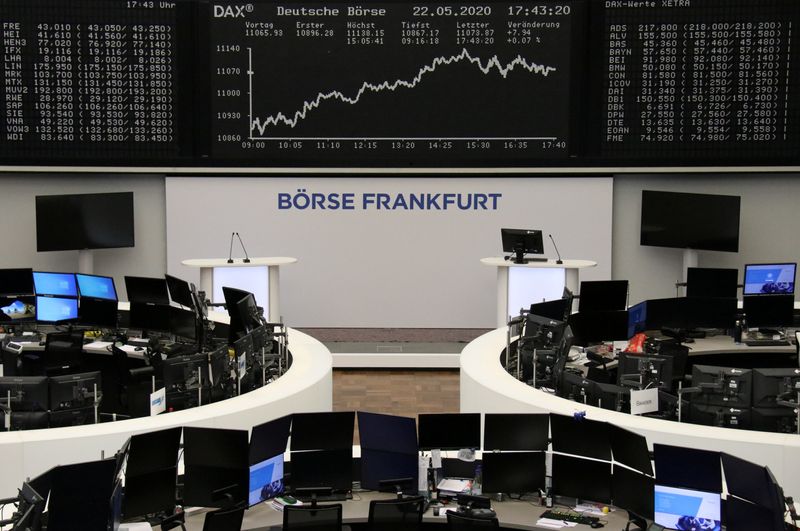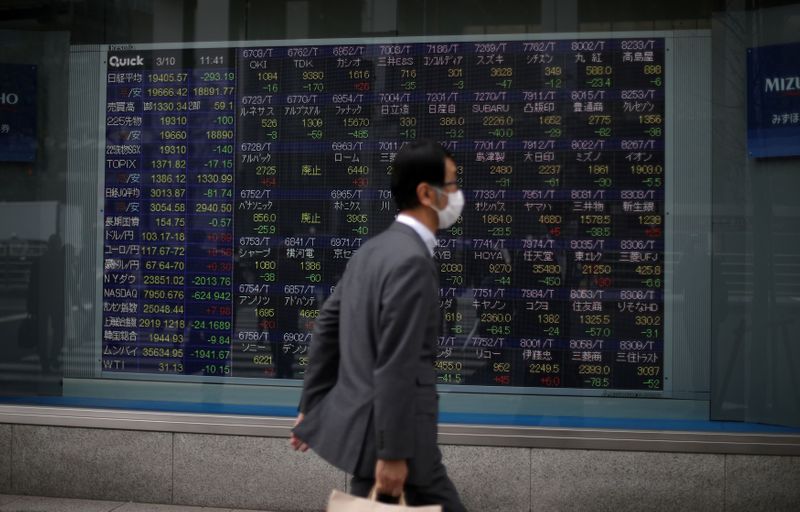By Yoruk Bahceli and Saikat Chatterjee
LONDON (Reuters) - Stocks gained modestly on Monday with many countries on holiday as German business morale rebounded strongly in May, offering a glimpse of optimism to battered investors of what lay beyond weeks of economic lockdowns.
MSCI's gauge of world stocks gained 0.4%, nearing a 2-1/2 month high. The pan-European STOXX 600 index was up 1.2%.
Lockdown measures introduced in mid-March have put the global economy on track for a recession this year. Only unprecedented stimulus by global central banks has held up world markets in recent weeks.
With nervous investors wary of adding to their equity holdings over concerns on what a post-lockdown world would look like, Germany's Ifo institute survey for May gave some relief.
The index rebounded more than a Reuters poll expected in May, recovering from its worst decline on record in April as a reopening of Europe's largest economy boosted corporate expectations.
"The low point of the slump should now be behind us and there even is the chance for a short-lived strong rebound in the coming months," ING economists told clients.
But analysts voiced caution, given the uncertainty ahead from the pandemic, with Ifo itself still expecting a double-digit contraction in Europe's largest economy in the second quarter.
"We shouldn't probably overemphasize the data because we have so much distortions from the coronavirus," said Jens Peter Sorensen, chief strategist at Danske Bank in Copenhagen, referring to difficulties survey respondents may face in evaluating the impact of the pandemic on economic indicators.
More optimism came from Japan and Spain. Prime Minister Shinzo Abe lifted the state of emergency for Tokyo and four remaining areas on Monday while the government is also considering fresh stimulus worth 100 trillion yen ($930 billion).
Spain also announced it will lift a quarantine requirement on overseas visitors from July 1, which may help its tourism sector.
In Europe, Italian 10-year bonds dropped to six-week lows despite the uncertainty of what a final package might look like, after a group of more hawkish states presented a paper against France and Germany's 500 billion euro recovery fund proposal.
The euro steadied around the $1.09 levels, recovering from earlier losses, as focus shifted to the European Commission's own proposal that is expected on Wednesday.
But with financial markets in Singapore, Britain and the United States closed for public holidays on Monday, market moves were relatively small and held within well-worn ranges.
CHINA-U.S. TENSIONS
Global stock markets were also set to make gains despite signs of renewed strains in Sino-U.S. relations over the weekend. China's move to impose a a new security law on Hong Kong has heightened concerns about the stability of the city and global trade prospects, and upset the United States.
The dollar, which tends to behave like a safe-haven asset during market turmoil and political uncertainty, touched a one-week high against its rivals in earlier trading, but erased gains in late London trading.
Ties between the two countries have deteriorated since the coronavirus outbreak, over which they have exchanged accusations of cover-ups and a lack of transparency.
"Rising tensions between the U.S. and China around Hong Kong, trade policy and who is responsible for the 2020 economic dislocation are threatening to end the post March-trough rally," said Perpetual analyst Matthew Sherwood.
Oil prices, which had been driven higher for the past four weeks, were steady on Monday, with U.S. crude oil up 0.35% to $33.62 a barrell and Brent up around 0.4% to $35.36

Spot gold was off 0.2% at $1,730.1 an ounce.
